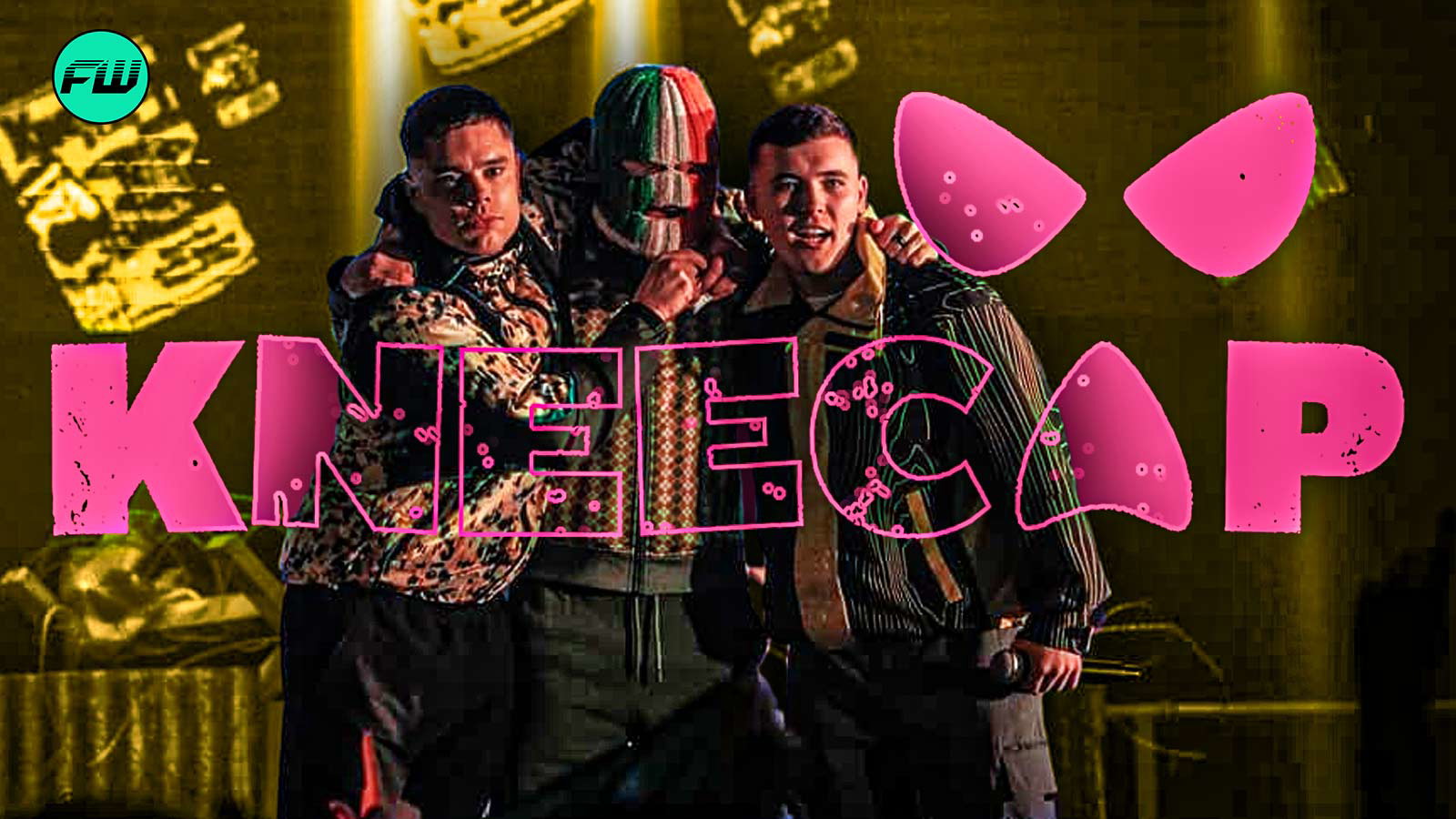The winner of the audience award in the NEXT section of this year’s Sundance Film Festival, Kneecap tells the story of the eponymous Irish hip-hop group — the only catch? The band members play themselves alongside a supporting cast that includes Michael Fassbender and Simone Kirby. The result is a film that feels incredibly energetic and surprisingly heartfelt, with a powerful message about the importance of preserving cultures and indigenous languages.
We at FandomWire spoke with Kneecap members DJ Próvai (JJ Ó Dochartaigh) and Móglaí Bap (Naoise Ó Cairealláin) about the film, their music, and their message. Like the film and the band’s music, the conversation was equally hilarious and insightful. Check out the interview below:
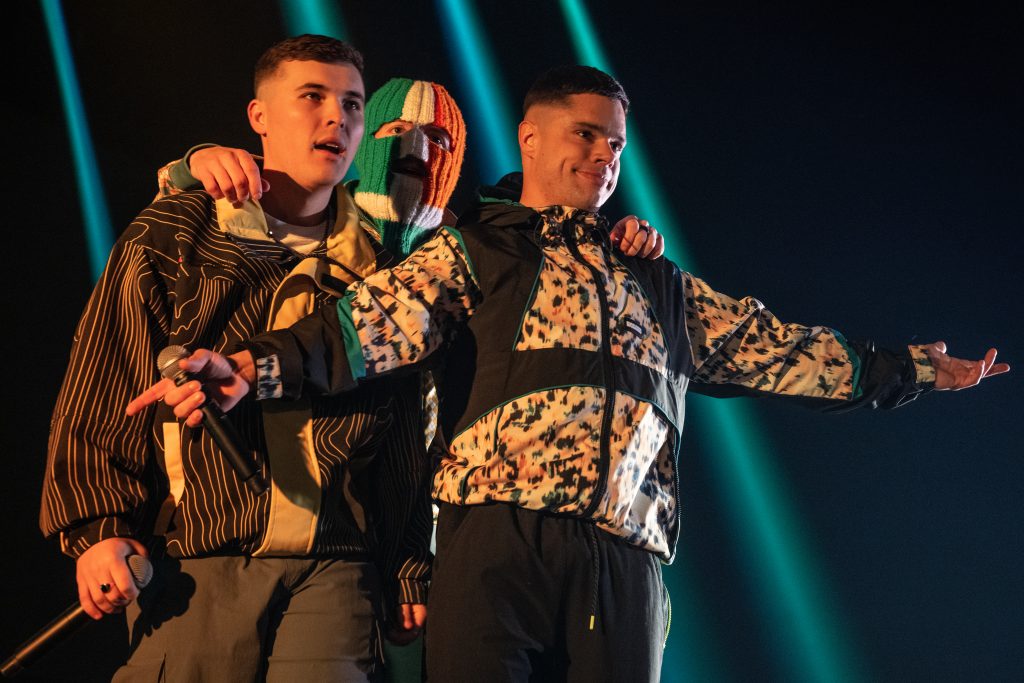
Kneecap Interview
FandomWire: Between the release of the film and the release of your album “Fine Art,” you’ve had one heck of a year. Is it exciting to be reaching such massive levels of international acclaim?
Móglaí Bap: Yeah, I mean, this is our first year touring around Europe a lot. We just came back from Denmark, Belgium, Amsterdam, Brussels, Madrid, and Portugal. So it’s crazy for us to be going around all these countries. I think it’s very unusual for a band to have a debut album and a film come out at the same time. So you can imagine we’re very, very busy. We haven’t had a minute yet. But it’s very fun. And it’s great for us to have the opportunity to go around the world and to connect with people from all different cultures and walks of life.
FW: One of my favorite things about your music is the diversity of your influences, and I think this film also has a diversity of influences to match that energy. What were some of your and Rich Peppiatt’s points of reference when telling your story?
DJ Próvai: I was a massive Britney Spears fan growing up. So I think you can see that. [He laughs.] The music’s mostly ours in the film as well, but we also wanted that kind of high-octane stuff like The Prodigy.
Móglaí Bap: I think he was talking about the movie’s influences.
DJ Próvai: Oh, Trainspotting was a massive one.
Móglai Bap: Yeah, Trainspotting.
DJ Próvai: And the person who wrote Trainspotting, Irving Welsh, went and saw the movie and said it was the best thing he’s seen in years, which was a massive kind of boost for us as well. Amélie was another one.
Móglai Bap: Yeah, Trainspotting was one of the main ones for us and Rich especially. When he came to us, he talked about Trainspotting because Trainspotting never diluted what they were doing to make it more digestible for an audience outside of Scotland. When you watch Trainspotting, their accents are crazy. It’s kind of like the book — the book is colloquial. It’s kept in the accent.
And that’s something that was very important for us from day one. We were never gonna make a movie and hope that it will be more digestible for audiences outside Ireland. And I’m sure that makes it a bit trickier for people outside Ireland to understand some of the terminology because we have some very local slang that people wouldn’t understand. But I think because of that, it makes it a very authentic and a very original film.
DJ Próvai: I think whenever that happens, as well, people want to watch it a few times to get the bits that they missed, which is better for sales.
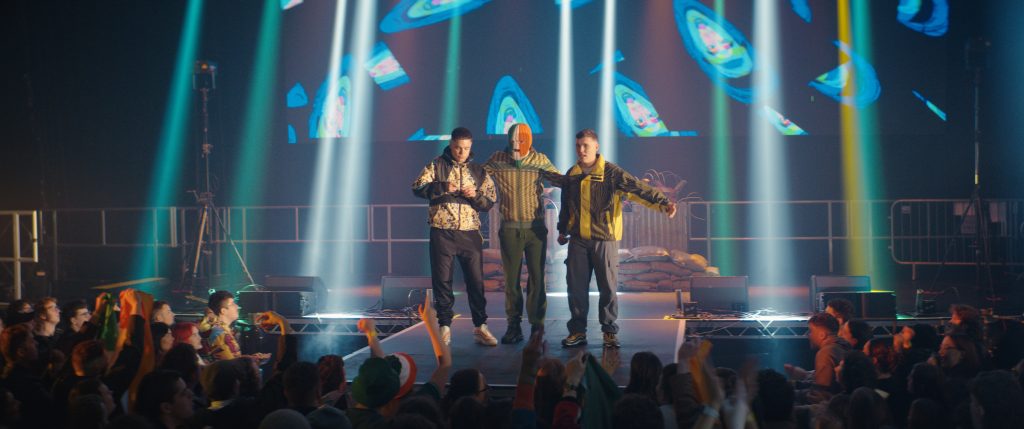
FW: Kneecap is more than a sex and drugs and rock and roll type of movie. It has those elements, but there’s so much more to it. Why do you think it was important for the film to have heart alongside its humor?
DJ Próvai: There are obviously different character arcs, and the language itself is a character as well. I mean, the movie is massively about identity. We grew up in a place where identity was taken away from us for so long after 800 years of colonization. So, reclaiming the language and reclaiming the culture is massively important to us, so we wanted to incorporate that into the film.
We’re at a time now in Ireland where people are starting to not be shameful about the language and the culture anymore and actually embrace it and are kind of proud of it. So the Irish language school system has grown massively in Ireland. Night classes. There’s a lot more people, even worldwide — we met a lot of people who came to the film from different countries and different backgrounds — who are learning Irish, or got on Duolingo.
Móglaí Bap: I think something the movie has is an unexpected emotional beat throughout the film, intertwined with all the chaos. I find that important because I think language, in general, is a feminine thing. You know, it’s your “mother tongue.” And I think it’s important to have that emotional beat through it because it’s quite an introspective thing. It’s an emotional journey when you’re reconnecting with your language and your culture.
So I think that’s why, even though there’s a lot of madness, the language brings it that energy and that feminine energy to the film. And it’s good that way because people aren’t expecting that emotional beat through the film of all the different characters.
DJ Próvai: You have the family dynamic with yourself, and the break-up dynamic with myself, and the sexual dynamic with the other guy.
FW: A lot of musicians are asked who they’d want to see play them in a biopic, but you guys got to play yourselves. Did you find this exciting? Scary? Why did you think this was the way to have your story told?
Móglaí Bap: Well, we asked Brad Pitt for Provaí.
DJ Próvai: But he wasn’t in shape, so I had to turn him down.
Móglaí Bap: It was the role we were born to play, as we always say. It was definitely exciting, and scary, and daunting, and fun — basically every emotion in one. Doing this movie based on our band and playing ourselves could have been very detrimental to our music careers. Because if it was a very crap film, I think a lot less people would be coming to see us at concerts.
DJ Próvai: Yeah, and when you’re playing yourself, you have a massive well to pull from in all your experiences because you can actually put yourself back in that moment. So that kind of made it easier in a way, but it also made it hard as well because you have to relive stuff and pull up those emotions.
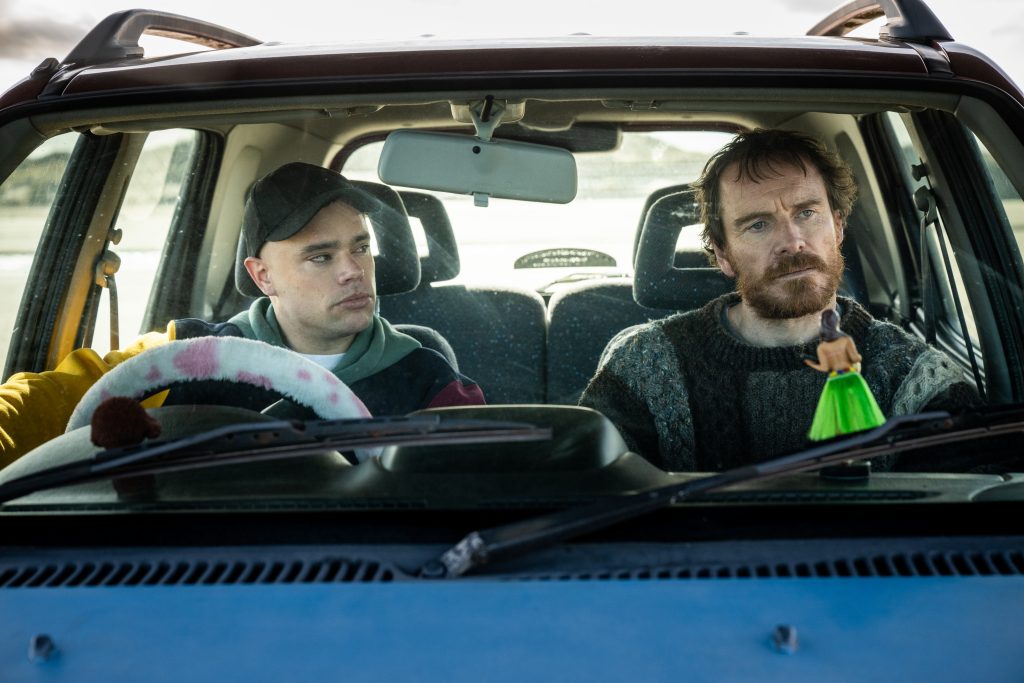
FW: Obviously, Kneecap is inspired by your lives, but it does stretch the truth some. What made you want to strike this balance between real and exaggerated?
Móglaí Bap: I mean, some of the more surreal or crazier stories are based on truth, and the rest are bits to kind of tie it all together. I will say that at the beginning of the movie, where I’m being christened on a Mass rock — which is a place where where Catholics would have said mass because Catholicism was outlawed during the Penal Laws — that part is true.
My parents brought me into a forest with a priest, and I was baptized on a Mass rock, and a British Army helicopter hovered above the christening. Which, if you’re watching the movie and you didn’t know that was true, you’d probably think that was not true because it sounds a bit surreal to have a helicopter hovering above a christening. But if you actually go on our Instagram, you’ll see a newspaper clipping from back in the day explaining the situation and how it happened.
DJ Próvai: They thought they were an IRA training camp.
Móglaí Bap: Yeah, they thought we were trading guns or something. But it was just me with a priest. I don’t know if that’s what made it very ominous, maybe. But some of the more surreal stories we say are true.
DJ Próvai: I was a teacher. And students used to come to the gigs. They’d be shouting my name up on stage, which wasn’t ideal for me because it was like, “Oh f**k me, they know who I am.” And then they would be rapping the lyrics at school — and I was working at a Catholic grammar school, so the stuff we were saying on stage and the actions we were doing on stage wasn’t really conducive to working in that kind of schooling. It was putting them into disrepute, so they had this big investigation to see if it was me, and I had to kind of get out of the way because the life wasn’t compatible anymore.
FW: I think music — particularly hip-hop and rap — has an important history and power as a political statement. Why do you think words, including your own, carry so much power?
DJ Próvai: Yeah, well, words are the most powerful thing in the world, really. Everything starts with an idea that’s vocalized. Even our first song, “Cearta,” came from us marching for Irish language rights. Because during the film, there was no Irish legislation, so Irish was kind of outlawed still. In the North, it had no legal defense in the courts. So, just from that one song, everything kind of snowballed off the back of that.
Móglaí Bap: I think words are important. And the people who tell the stories with their words and oral history are important because, a lot of the time, it’s the winners that write history. But it’s the people who maintain the real history and the oral history.
In Ireland, folklore and oral history is very important. And I think hip-hop kind of aligns with that as well because hip-hop carries the stories of people whose stories aren’t being told in the mainstream. And I think that’s why it resonates with us so much: because it gives us an opportunity to tell our stories. And maybe it’s not a story you’ll read in a history book, but it’s a story you’ll hear on the streets.
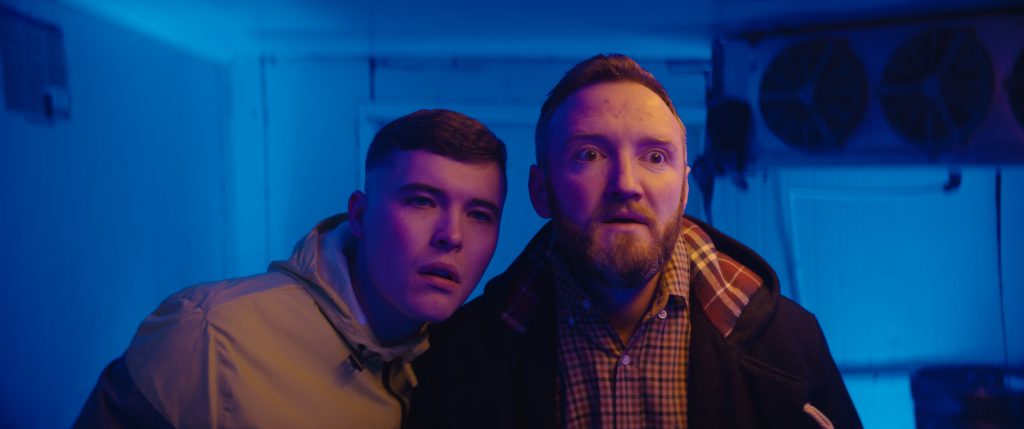
DJ Próvai or JJ in ‘Kneecap.’ Image: Ryan Kernaghan. Courtesy of Sony Pictures Classics.
FW: You mentioned that many of the stories you tell are about things that don’t get the international spotlight, like the fight to preserve the Irish language and culture. Why do you think the rest of the world should know about this?
Móglaí Bap: I think in today’s terms, where there are so many languages being lost, and there’s globalization, and everyone’s speaking English or Spanish or whatever mainstream global language, it’s important for people to hear this story because there are people in Ireland who refuse to let the language die and who carry on the heritage and the language and the culture. And it’s not necessarily the most financially beneficial thing to do. You’re not going to be a millionaire per sé because you speak the language. But it carries a lot of intrinsic value, a lot of wealth.
And again, this word identity is so important because language and identity — they are intertwined. We’ve met a lot of people who’ve seen the movie, who come from different cultures or minority cultures with their own indigenous language, and it makes them reflect on their own relationship with their culture and their language and maybe reconnect with it.
So I think that’s a privilege for us now to have this film because people will see it and be inspired to hopefully reconnect with their own culture. And the more cultures and languages that are kept alive in this world, it’s going to be a better world. Because once we’re all speaking English and Spanish and Chinese, and that’s it, I think it’ll be quite boring.
DJ Próvai: Yeah, and language kind of connects you to the land as well. We have a friend who wrote a book called “Thirty-Two Words for Field,” and if you have that break between the people and their language and their heritage and the line that came before them, you don’t know where you’re coming from.
So, in Ireland, you have all these place names, like Ballyshannon. “Baile” means “the town of,” or Derry, where I’m from. Derry doesn’t mean anything in English; it was just an Anglicization of it, but “Daire” tells you it was the place where all the oak trees grew. “Béal Feirste” — Belfast — tells you it’s the mouth of the Feirste River that comes in.
But without that connection to the language, you lose all that. You lose your connection to the land; you lose what everything means. Our indigenous cultures and languages know what plants are going to help this disease or whatever. But as soon as you kill off that culture or that language, you lose all that information. All that connection to the land and the world. And that’s easily given up these days; you know the Amazon is getting cut down at a massive rate, and you don’t realize the damage it’s doing.
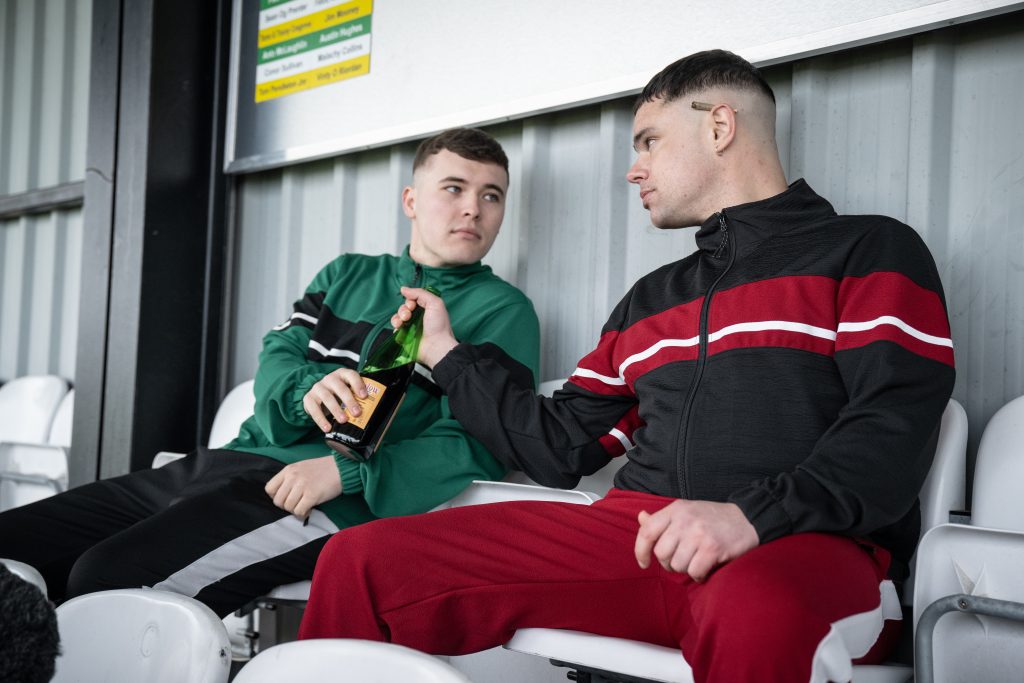
FW: I think something that works really well about Kneecap is that it’s obviously very fun, but it’s also very provocative. I think that helps the message that you guys were talking about resonate. Why do you think this is the case?
Móglaí Bap: There’s this image of minority languages that, if you’re going to portray it, it has to be portrayed in a certain way — like an artsy way, in a non-provocative way — and you can do it. If you’re singing in a nice way or you’re dressed in your traditional clothing. I think this movie has a different approach to it, and I think a resonance because it has a lot of anger and a lot of energy. And I think that is the kind of energy that will be needed and required for us to maintain these languages.
And to keep these languages alive, we can’t be passive with the languages. We have to have this fight in us. And it’s that fight that has kept the Irish alive for so long, and other languages around the world. So I think it’s an important element of keeping languages alive because there’s so much pressure all around the world for these languages to die off. And there are indigenous languages being lost — countless every day all around the world. So, I think that provocative, angry, energetic fight is what is needed for these languages to survive the pushback.
DJ Próvai: And people will love it and people will hate it, and that kind of dichotomy of it as well creates a kind of dialogue where people can chat about these things. So it’s not just like, “Let’s not talk about anything.” That’s what’s wrong. People won’t talk about things, and nothing gets resolved. It’s just, “You have your idea; keep it to yourself.” And this opens up a dialogue for people to question, “Well, maybe there is a value to these languages and these kinds of cultures.”
Kneecap hits theaters on August 2.
Follow us for more entertainment coverage on Facebook, Twitter, Instagram, and YouTube.

